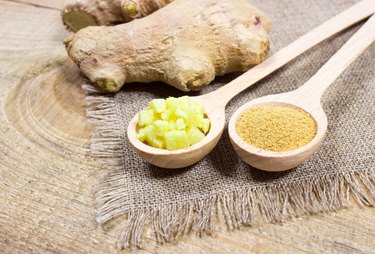
Ginger root is a rhizome, which means it is an aromatic underground stem. This root is a common ingredient in many cuisines, including Asian and Indian dishes. Ginger has properties beyond providing a spicy, sweet taste to these cuisines, however. It has been used for the treatment of nausea due to pregnancy or motion sickness, arthritis, stomach upset, asthma, diabetes, and other conditions. Ginger can be found in many forms including a fresh root, dried, crystallized, uncrystallized, powdered, and in pill form. Uncrystallized ginger is especially convenient because it is stable at room temperature, easy to transport and can provide relief to several ailments.
How to Recognize Uncrystallized Ginger
Video of the Day

Uncrystallized ginger is often confused with crystallized ginger. In fact, they are very similar in processing and appearance. To make uncrystallized ginger, pieces of root are cut into pieces and cooked in a sugary syrup until they become sticky and soft. They are removed from the syrup and left to drain before being packaged. Crystallized ginger undergoes one more step in this process; it is rolled in granulated sugar to create a candy coating. Both uncrystallized and crystallized ginger can be found at supermarkets in the spice and baking aisles. Uncrystallized ginger is preferred by many individuals because it is not coated in a sweet, sugary coating, therefore making it more versatile.
Video of the Day
Research on the Effects of Ginger
Researchers are investigating the role ginger plays in preventing nausea, vomiting, stomach upset and inflammation. Uncrystallized ginger is a convenient, portable way to decrease nausea on long car rides without the side effect of drowsiness. It is gaining attention for easing the nausea and vomiting associated with chemotherapy as well. In a study published in the August 2011 issue of the "Australian Journal of Medical Herbalism," researchers tested the nausea and vomiting severity in an experimental ginger-consuming group and a control group without ginger supplements. There was a significant decrease in the severity of nausea and vomiting within the ginger-consuming group compared to the control group. Moderate to severe symptoms were seen in 77 percent of the control group, while only 33 percent of the ginger group experienced these symptoms. Other data suggests that ginger may play a role in reducing inflammation and pain; however, more research is needed on this topic. Researchers are also investigating whether ginger can interfere with prescribed medications. It is important to alert your health care provider of all natural remedies you are taking, including ginger supplements.
Ginger Aids in Digestion

In addition to its role in decreasing nausea and vomiting, ginger is gaining attention as a digestive stimulant to reduce stomach discomfort. Ginger stimulates the production of gastric secretions that aid in digestion by moving food more quickly from the stomach to the intestines. This can help decrease the pain and pressure associated with stomach bloating, cramping and diarrhea. Ginger has been used as a homeopathic remedy for stomach ailments since the ninth century in Asia.
Incorporating Uncrystallized Ginger Into Your Diet
Uncrystallized ginger is easy to fit into your daily food patterns. This form is more versatile than crystallized ginger because it does not contain a sugary, sweet coating. It can be eaten by itself and will result in a spicy snack. This can be overpowering to some palates; luckily, there are many other ways to use it. Slice uncrystallized ginger and add to hot tea for a warm, soothing drink. It can also be minced and added to stir fry sauces for a chewy, spicy bite. Try adding minced pieces of ginger to cookie or muffin batter as well. Incorporating uncrystallized ginger into your diet in these ways can help decrease stomach upset while adding delicious flavor. Look for uncrystallized ginger at your local supermarket or health foods store.